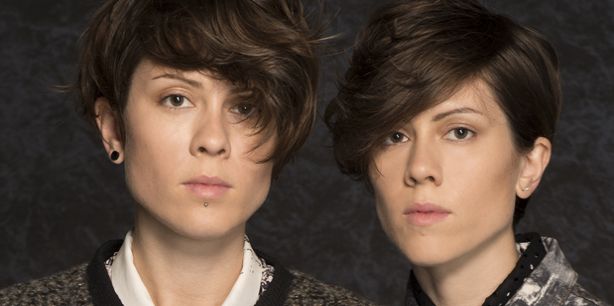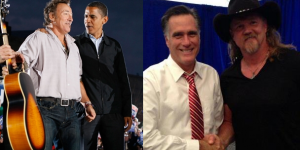 Music
Music
Tegan and Sara give love a bad name with new album 'Heartbreaker'
by Mark Teo
February 13, 2013
At a table tucked in a corner of Toronto’s upscale Fairmont Hotel, we’ve come to meet Tegan and Sara Quin, in town for a now-cancelled opening gig with the Killers. Sara is taking a short break from our conversation, instead treating the place to a rendition of “You Give Love A Bad Name.” She hits each note with frightening accuracy—no surprise, really, as she admits that “our whole touring group sings karaoke all of the time. After a few drinks, we’ll sing anything Bon Jovi.” In other words, she’s well practiced.
Sara’s glib comment is more telling still: The songs that populate karaoke jukeboxes, like Bon Jovi’s, are timeless, universal, and, with few exceptions, unabashedly pop. And after a decade of penning intensely personal indie-pop, the Quin sisters are set to release Heartthrob, a full departure for sunny FM-radio airwaves, complete with playful, built-for-the-arena hooks. For anyone listening closely, such an evolution shouldn’t come as a surprise, considering they’ve spent the last half-decade glossing up their hooks and guitars and, y’know, playing arenas. It’s maybe more surprising that Tegan and Sara hadn’t penned a collection this brash earlier.
“We said we wanted to make a pop record like the ones that Alicia Keys and Katy Perry and Rihanna made, but we wanted it to sound like a Cyndi Lauper record,” Tegan says. “Production technology has advanced, but Cyndi Lauper wrote classic songs that don’t date themselves, because they’re so perfect.”
Heartthrob began with extensive remote demoing—while both were born in Calgary, Tegan now lives in L.A. and Vancouver, while Sara currently calls Montreal home. So its creation story began as all Tegan and Sara albums do—with fistfuls of emails. “That’s just how we do it. We’ve never been the type of band who sits around in the studio and works out a song,” adds Sara. “We’ve been apart for what, seven years now?”
But while their communications methods haven’t changed, for Heartthrob, their songwriting approach did. Instead of writing on acoustic guitars—which have historically been the backbone of Tegan and Sara songs—the Quins wrote tracks differently: Sara demoed her tracks using Logic to build digital drums and snythesizers, which gave them an “active pop bounce” from the get-go. Tegan, for her part, wrote many of her songs on keyboard.
“The guitar is a bit of a roadblock,” says Tegan. “I’ve gotten quite competent at it, but I’m a piano player. Playing on the piano was easier—it was less held back. [Warner Records chairman] Rob Cavallo told me that Paul McCartney would sometimes just wake up and hit chords on the piano until he wrote a song, and that’s what I did for ‘Closer.’ I never did that on guitar.”
“We sentimentalize all these relationships, but they slip away. Heartthrobs fade over time.”
In passing, both sisters say Heartthrob—which was produced largely by Greg Kurstin, a man responsible for sculpting acts such as Lily Allen and Kylie Minogue—fits neatly into Tegan and Sara’s sonic universe. But from the outset, Heartthrob was different by design.
Prior to recording, says Tegan, the duo created aspirational lists of where they wanted the album to take them: They wanted to appear in bigger magazines, play bigger venues, make bigger touring plans to more exotic locales. As a result, Heartthrob is undeniably a bigger album, at turns channeling the bold attitude of Cyndi Lauper, the nuanced swagger of Olivia Newton John, and the larger-than-life, glossy hooks of contemporary pop.
Indeed, it’s a grandiose departure—while Tegan and Sara’s songs are notoriously intimate, this collection is curiously extroverted. Intentionally so, they say: The sisters wanted to emulate eras when pop music and popular music were synonymous terms.
“The generation that I meet that was born in the ‘90s, they don’t even remember a time when a band was so big that they were universal. They just don’t,” adds Sara. “Rihanna or Taylor Swift seem huge now, because they fill arenas and sell a million records. But that’s a fraction of what it used to be like. But what’s exciting and infectious about pop now is that you’re not limited—you don’t have to preserve this brand, this sound.”
It’s Sara’s subtle way of saying that they don’t want to be bound to their past—even if it’s the bedrock of their success. Still, she cautions that Heartbreak shouldn’t be considered artistic compromise. “We’ve been careful but ambitious,” Sara adds. “We respect our band and our achievements, and the people who listen to us.”
Then comes the inevitable question: who are, or were, Tegan and Sara’s heartthrobs? They list Madonna, the ever-present Lauper, and New Kids on the Block as childhood idols—especially NKOTB, Sara adds, because they were “boys that girls loved and crushed on.” But pop-culture obsessions isn’t what Heartthrob’s about.
“It’s about the energy exchange when you become the idolizer, when you create a heartthrob from a regular person,” says Tegan. “Nothing they could do is wrong, everything they do is idyllic and perfect. It’s a once-in-a-lifetime experience.”
In other words, Heartthrob isn’t actually about heartthrobs; it’s about love. Young love. Intense love. And how love changes with years, distance, and perspective. “Through constant analysis and shape-shifting, those early relationships hold so much power,” says Sara. “As a songwriter and a storyteller, it’s essential to go back to look at those stories and ideas. I always go back to Romeo and Juliet—that entire story spans two days, and they killed themselves over each other.”
Typical of their work, Heartthrob is defined by its polarized perspectives. Sara’s in it to claim ownership over her heartbreak. “We sentimentalize all these relationships, but then they slip away. Heartthrobs fade over time,” says Sara. “I don’t have as much nostalgia to my music [as Tegan does]. My songs on Heartthrob are about reclaiming the memories I had from previous relationships.”
Yet if Sara’s explanation seems vaguely academic, Tegan’s is downright visceral. “Sara told me the other day, ‘I could’ve been rejected once, and I could write about it forever. That rejection, especially as a performer, is infinite,’” recalls Tegan. “For me, it was the flip side of the coin: you only have to fall in love once to remember that feeling forever. It’ll never be the same as the first time you experience that nauseating, intense, heart-pumping nervousness.”
Getting shot through the heart and playing the game could almost be the tagline for Heartthrob. “We wanted to write 10 Tegan and Sara songs that are undeniably timeless, “ Tegan says. “If these songs aren’t on karaoke machines in 10 years,” she laughs, “then we haven’t done our job.”

This article originally appeared in the February 2013 Issue of AUX Magazine.
Download and subscribe for free in the app store.
Tags: Music, Cancon, Interviews, cyndi lauper, Eminem, Greg Kurstin, Madonna, New Kids on the Block, Sara Quin, Tegan and Sara, The Killers





